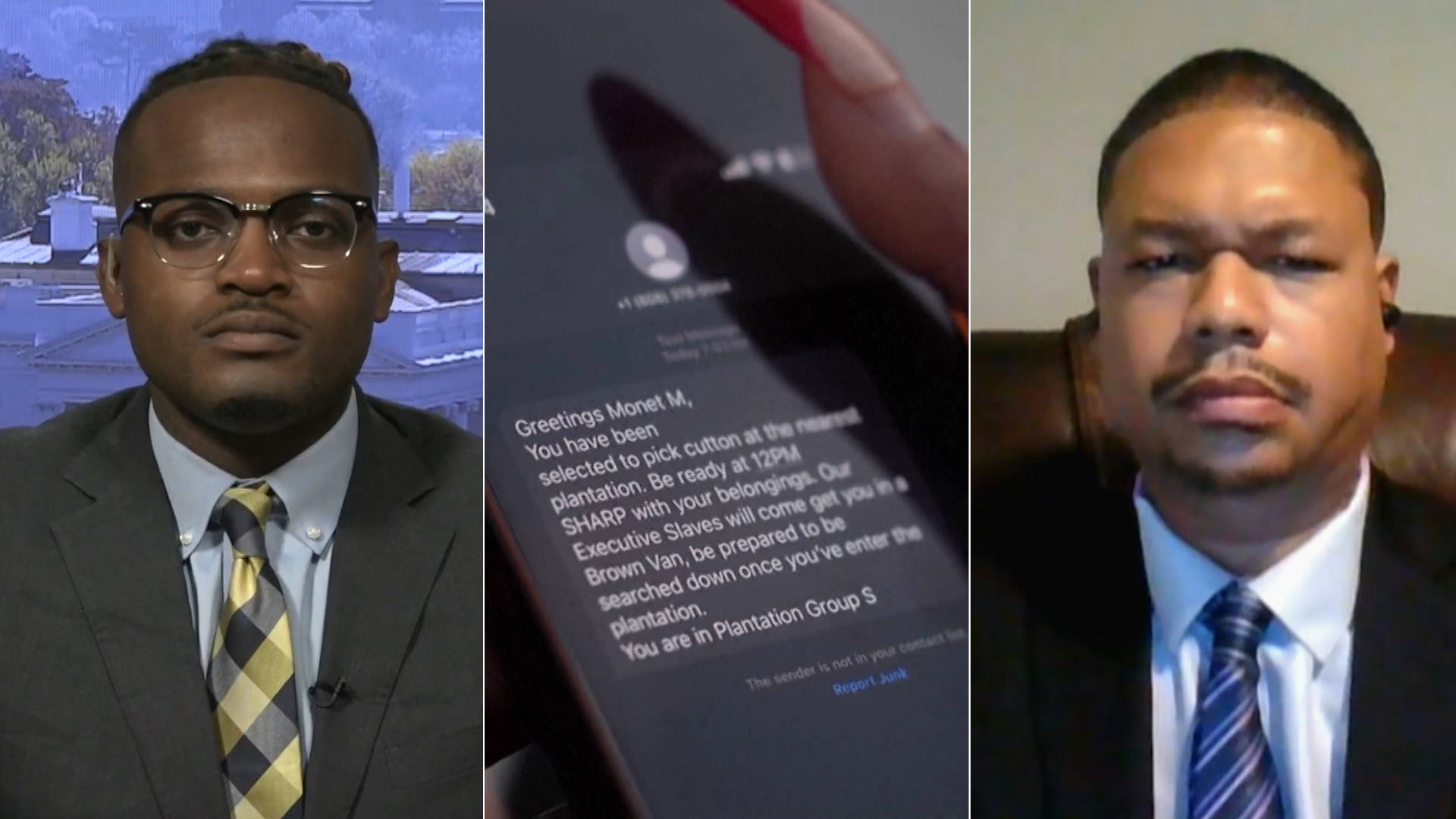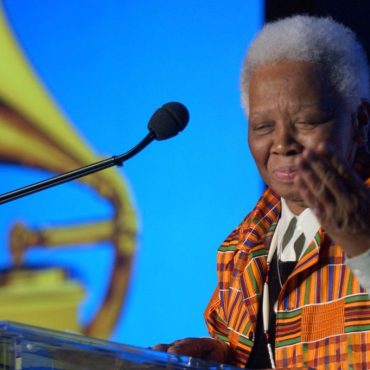This is a rush transcript. Copy may not be in its final form.
AMY GOODMAN: We begin today’s show looking at the spate of racist text messages referencing slavery that were sent to Black people across the United States starting the day after Donald Trump’s election victory. People in New York, in Alabama, in California, Georgia, Illinois, Indiana, North Carolina, Ohio, Pennsylvania, Tennessee and Virginia, including students at historically Black universities and even middle schoolers as young as 13 years old, reported getting a variation of this message that was addressed to them by name: quote, “Greetings William Hines, you have been selected to pick cotton at the nearest plantation. Please be ready 11/07/24 5pm SHARP with your belongings. Our Executive Slaves will come to your address in a black SUV. Be prepared to be searched down once you’ve entered.”
A similar text message sent to a man in Charlotte, Virginia, read, quote, “Greetings, Samuel You have been selected to pick cotton at the nearest plantation. Be ready at 12PM SHARP with your belongings. Our Executive Slaves will come get you in a Brown Van, be prepared to be searched down once you’ve enter the plantation. You are in Plantation Group W.”
Monet Miller described her reaction when she received the racist text message.
MONET MILLER: I immediately texted the number back, “Who is this? Oh my god!” Profanity. And then I even tried to call it. And that’s when I found out it was, like, from a fake text — one of those, like, fake numbers, so it had already been discarded.
AMY GOODMAN: The FBI and FCC — that’s the Federal Communications Commission — say they’re now investigating the racist text messages, and the source remains unclear. They just know it comes from TextNow. A Trump campaign spokesman said it, quote, “has absolutely nothing to do with these text messages.” This is Georgia’s NAACP President Gerald Griggs.
GERALD GRIGGS: Our response is to remind the young people where they come from, who they are, and that we do not sit back and allow people to threaten us without a response — a nonviolent peaceful response, but a forceful response, that this is our country. We’re not returning to any plantation. We built this country. We’ll continue to make this country move forward and live up to the promise that it gave all the citizens.
AMY GOODMAN: Meanwhile, Fisk University, the historically Black college in Nashville, Tennessee, issued a statement calling the messages that targeted some of its students “deeply unsettling.”
For more, we’re joined by two guests. In Washington, D.C., Wisdom Cole is with us, senior national director of advocacy for the NAACP. And in Columbia, South Carolina, Robert Greene II, history professor at Claflin University, president of the African American Intellectual History Society, senior editor of Black Perspectives, co-editor of a book titled Invisible No More: The African American Experience at the University of South Carolina.
We welcome you both to Democracy Now! Professor Robert Greene II, can you talk about what happened at Claflin, the students and others who you hear got these text messages and the response? Claflin is what? The oldest historically Black university in South Carolina.
ROBERT GREENE II: Yes, that is correct. And first off, thank you so much for having me on this morning.
I can tell you that I heard from both students about the text messages and also from our campus security force, who sent out an email explaining to folks what the text messages were, to remain calm, but to also remain aware and alert of what was going on. Initially when I heard about the text, I thought it was a bit of a hoax, but I soon began hearing from both students and campus security about it, and it quickly became clear that this wasn’t just a Claflin problem, it was a national issue, as well.
AMY GOODMAN: And what were the response of students, for example, who got these text messages? I mean, we hear the young woman who said — I mean, she sees the phone number that it’s coming from, and she texts back immediately because she was scared.
ROBERT GREENE II: Well, certainly, I think for many of our students it was a bit of a surprise to receive those text messages. On the other hand, our generation of students have grown up receiving a lot of text messages from a lot of unknown phone numbers. I think what makes this a bit different was the content of the messages themselves. For many students, they were surprised. They were a bit hurt. And coupled with the actual Election Day results, it has been a pretty frustrating week for many of our students.
AMY GOODMAN: Let me ask you, Wisdom Cole — you deal with young people around the country. Talk about what the NAACP has heard. How extensive is this?
WISDOM COLE: You know, these messages are deeply disturbing, right? You know, as you said earlier, children as young as 13 have received these messages across the nation, I believe across 32 states. You know, this is a disturbing message to receive shortly after the election, right?
But the sad part about it is that this is only the beginning. You know, when we see what’s happening in this newly elected administration, we’ve seen this before — right? — you know, the stripping away of diversity, equity, inclusion, the stripping away of our rights, right? You know, messages like this continue to set a precedent in terms of racism in America, in our schools and in our phones. It’s important for us to be able to protect our young people and allow them to understand that they deserve to be in those spaces, that they are a part of our community and our culture, and they’re a part of what allows us to propel for our future.
AMY GOODMAN: Now, what is the NAACP demanding, Wisdom Cole? I was interested that when the Trump campaign was asked to respond — this came out right after Trump was elected — they responded, “This has nothing to do with us.” They didn’t go on to say, “And we consider this vile and racist, and it must stop.” What exactly are you demanding? What do you understand from the company that was the platform for this? Was it called TextNow?
WISDOM COLE: You know, regardless if you believe it has nothing to do with you, it impacts the future of our country. The real question is: What are you going to do about it? How are you going to ensure that everybody in this nation feels safe, that people feel like they can talk about their community, can talk about their culture, can be embraced, that they do not have this sense of fear?
Many organizers across this nation have been working tirelessly over the last election season to ensure that we get this right. You know, it’s important for us to recognize that, moving forward, that there are a lot of things that are particular to our community that is going to be at stake, right? We are seeing an increase — and we’ve seen this before, right? — increase of racial hate in this country. And so, with messages like this, we have to say enough is enough. We have to say that hate has no place here and that we have to ensure that there are protections for us at the local, state and federal level.
AMY GOODMAN: Professor Robert Greene II, I’m interested that you’re at Claflin. Both Claflin and South Carolina State are in Orangeburg, South Carolina, a very violent history against African Americans. 1968, the Orangeburg Massacre, one of the most violent, least remembered events of the civil rights movement. February 8, ’68, crowd of students protesting at South Carolina State University Orangeburg’s only bowling alley, which was segregated. After days of escalating tensions, student started a bonfire, held a vigil. Dozens of police arrived, fired live ammunition into the crowd. Three students were killed, 28 wounded. If you can talk about that history and how people are organizing right now around these messages and the involvement now of various federal agencies investigating?
ROBERT GREENE II: Well, certainly, whenever something like this happens to students in Orangeburg, there’s always a sense of thinking about what the Orangeburg Massacre means to us in 2024. Both universities have even longer histories of confronting racism than that. Certainly, you have the Orangeburg movement of the 1950s and ’60s, which leads up to the Orangeburg Massacre of 1968. Decades before that, you have buildings on both campuses being burned down under so-called mysterious circumstances.
And so, for students at Claflin and SC State, the one thing they can take solace in is that they can tap into a long history of activism, protest and resistance against oppression and tyranny. Many of those veterans of the civil rights movement, such as, for example, photographer Cecil Williams, still live in the Orangeburg area even now and offer their help and support of the students in a time like this one.
As for right now, I think students are organizing not just against the text messages, but they’re organizing themselves for a long struggle against the upcoming second Trump administration. But for them, the text messages are in many ways another galvanizing call to resistance and thinking about new and creative ways to resist what they perceive to be a very troubling Trump administration.
AMY GOODMAN: And finally, Wisdom Cole, in Washington, D.C., plans are already underway for mass protests on January 18th, two days before the Trump inauguration. How is the NAACP dealing at this point?
WISDOM COLE: You know, at this point, it’s really important for us to take the time to dream of a better America, for us to be able to restore ourselves and understand about creative ways in which we can take on the most challenging problems that are going to face us in this new administration. I urge all of my organizers to be ready to defend. Right? There are so many rights that we must protect in this nation. We have to organize. We have to build, so that one day we can win on all levels. It’s important for us in this moment in time to understand the power that is within the people and that for us to be able to come together to organize and understand this problem is absolutely necessary, because as we see our rights be stripped away, we’re going to slowly realize that we are more common than we know.
AMY GOODMAN: Wisdom Cole, I want to thank you for being with us, senior national director of advocacy for the NAACP, speaking to us from Washington, D.C., and Robert Greene II, history professor at Claflin University, the oldest Black university in South Carolina, president of the African American Intellectual History Society, editor of Black Perspectives, co-editor of Invisible No More: The African American Experience at the University of South Carolina, speaking to us from that state.
Next, more than 2,000 people packed the historic Riverside Church here in New York City to discuss America and the war on Palestine, moderated by author Ta-Nehisi Coates. Stay with us.











Post comments (0)